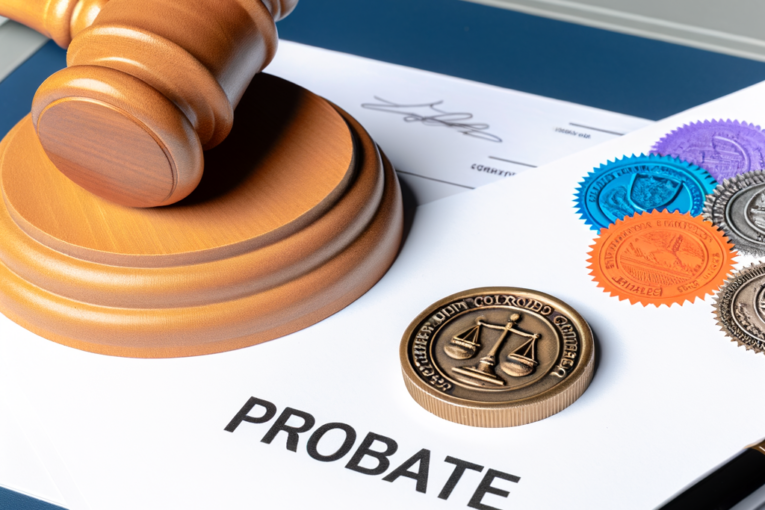Dealing with the loss of a loved one is difficult enough without having to navigate the confusing legal and financial process of estate settlement. Many people feel overwhelmed when faced with probating a will or settling an estate without clear guidance.
However, understanding the key steps and timeline for wrapping up someone’s personal and financial affairs after they pass away can help bring order to the chaos. This comprehensive guide breaks down the estate settlement process in simple, actionable steps to empower you to properly handle the transfer of assets with professionalism and compassion.
What is an estate settlement?
Estate settlement refers to the process of handling a deceased person’s final affairs and distributing their property after death. It involves taking inventory of assets, paying outstanding debts and taxes, and transferring the remaining property to the heirs. The estate settlement process depends on whether the person left a legally valid will outlining their wishes.
Probate is the court-supervised process for validating the will and authorizing the personal representative to carry out the will’s instructions. It ensures assets transfer properly under the law and that outstanding debts and taxes are paid before distribution to heirs. Not all estates need to go through formal probate, however, especially if assets were owned jointly or had designated beneficiaries.
The Probate Process: A Step-by-Step Guide
If probate is necessary, navigating the legal system can seem daunting without the right guidance. Here is an outline of what to expect in the probate workflow from start to resolution:
Initiating Probate
The first step is to file a petition with the probate court in the county where the deceased permanently resided. The petition requests the appointment of an personal representative and the court’s acceptance of the will’s validity. Once approved, the personal representative can start acting on behalf of the estate.
Inventorying Assets
One of the main responsibilities of the personal representative or administrator is to conduct an inventory of probate assets, which includes:
- Real estate
- Bank accounts
- Retirement accounts without beneficiary
- Household furnishings
- Vehicles
- Other personally-owned valuables
Everything must be appraised professionally or valued at estimated market prices.
Settling Debts
Unpaid debts, like credit card balances or medical bills, must get settled before assets can be transferred to heirs. Secured debts, like mortgages or auto loans, may need to get paid for heirs to obtain unencumbered assets.
Paying Taxes
Certain assets trigger estate taxes at both the federal and state levels if they exceed exclusion thresholds. Income taxes may also need filing for the deceased’s final tax return. An experienced probate attorney handles complex estate and inheritance tax calculations and filings.
Distributing Assets
After everything is valued, paid, and reported properly, the remaining probate assets can get distributed to beneficiaries named in the will or determined by state law if there was no will (intestate succession). Certain types of jointly owned or non-probate assets bypass probate.
Key Players in Estate Settlement
Handling the often lengthy probate process while grieving can be challenging without support. Relying on the right professionals and understanding each of their roles is crucial.
Personal Representative
Also known as personal representative (if there is a will) or estate administrator (without a will), this main contact person is responsible for navigating court procedures, inventorying assets, communicating with creditors, resolving estate taxes, and distributing inheritances once court approval is received. Compensating the personal representative for administrative work done is usually allowed and paid from estate funds before any other distributions.
Probate Attorney
While not required in all cases, a probate lawyer can provide invaluable guidance on even moderate estates with non-straightforward assets or debts. Navigating tax filings, creditor communications, property appraisals, court petitions, and other paperwork is generally smoother with an experienced attorney. Legal fees become part of administrative costs paid early on by the estate.
Beneficiaries
Inheritors of assets, per the deceased’s will or state laws in the absence of a will, have certain rights during probate, including the right to get notices of court petitions and receive a copy of the will once admitted by the court. They can also monitor progress and request updates on any delays from the personal representative handling the estate.
Common Challenges and Considerations
Despite meticulous planning, probate can still encounter hiccups, delays, or disputes that complicate the process. Being aware of a few common scenarios can help you address them constructively.
Contested Wills
When one or more beneficiaries dispute the will’s validity or certain provisions, a will contest enters litigation. Most courts require filing such contests within strict deadlines after receiving notice. Will disputes unfortunately tie up the estate resolution as all beneficiaries argue their positions. Grounds are typically technicalities around signing/witnessing procedures or questions on the deceased’s mental capacity or vulnerability to coercion/fraud.
Intestacy
Without clear instructions in a will, state intestacy laws determine who inherits which percentages of probate assets. Complex or hostile family dynamics make intestate resolutions much more complicated. Even when a will exists, some assets may fall to intestacy if omitted or ambiguously referenced in the will. Consulting an attorney helps immensely for intestate estates.
High Probate Costs
Between attorney fees, personal representative compensation, appraisals of high-value assets, court costs, and taxes, probate administration can become costly, depending on the estate’s complexity. For moderate estates, however, having an organized personal representative guiding routine matters often avoids excessive expenses if litigation or disputes don’t arise.
Planning for a Smooth Estate Settlement
Beyond crafting a thoughtful will, a few additional estate strategies help alleviate administrative burdens down the road after you pass away:
Beneficiary Designations
Certain assets, like life insurance policies and retirement accounts (401ks and IRAs), allow you to directly name “beneficiaries” who inherit them automatically without awaiting probate approval. Ensuring your beneficiary designations stay aligned with your will helps assets transfer smoothly.
Living Trusts
Lifetime trusts let you place assets like real estate into the trust’s name, designating select beneficiaries. By legally avoiding probate already in life, property transfers faster later and avoids public processes. Trusts incur upfront costs and administration but reduce overall estate friction.
Proper estate planning guides your legacy distribution when gone and protects loved ones’ interests in the process. Consult an estate attorney to craft strategies balancing probate avoidance with flexibility as your circumstances evolve.
Conclusion and Next Steps
As the saying goes, the only certainties in life are death and taxes. Having a plan for both can provide peace of mind that your affairs will stay protected if you pass away or become incapacitated without warning. Whether you have modest or extensive assets, putting even basic estate-planning documents in place now ultimately safeguards your intentions, even years later after significant life changes.
To recap, the keys to gracefully handling estate settlements include:
- Get clear on exactly what you own. Conduct a full inventory of assets and liabilities
- Document your intentions. Create or update your will regularly as a guide for heirs
- Understand default rules. Learn your state’s intestacy laws if no will exists
- Name trustworthy personal representatives; designate responsible contacts to oversee administration
- Minimize probate where possible; funnel appropriate assets to joint ownership or beneficiaries
- Ask for help – Hire an attorney to customize a strategy reflecting your unique needs and family dynamics
Estate planning sounds daunting, but breaking it down into approachable steps makes the process manageable rather than scary. Your loved ones already face profound grief at your passing. With some forethought now, you can thankfully avoid burdening them additionally with preventable administrative frustrations later.
Consult an estate planning attorney to get the ball rolling or add clarity to existing documentation. An ounce of proactive planning gives priceless peace of mind, allowing you to live presently without undue worry about your legacy.
FAQ
All personally owned assets get distributed either per the instructions in your will or according to state law intestacy provisions if no will exists. Certain non-probate property directly transfers to joint owners or named beneficiaries outside of court processes.
You can minimize or eliminate probate using living trusts and proper beneficiary naming, but having a will alone does not avoid court validation, especially for solely owned assets above state threshold limits or significant debts needing settlement.
Probate administration spans anywhere from 6 months to 2+ years, depending on estate size, asset types, debts, taxes due, and whether disputes arise. Small, straight-forward estates can probate in under a year.
Living trusts let you retain control of assets while alive but ultimately transfer them privately after death directly to beneficiaries per trust terms, avoiding probate. This also minimizes estate taxes for large estates and shields information from public records.
With joint tenancy ownership and assets having designated beneficiaries, many estates can fully avoid probate if no disputes exist around prior estate transfers or remaining asset distribution. But legal procedures give heirs recourse to resolve legitimate concerns.
State intestacy succession laws determine who inherits assets, often prioritizing spouses and blood relatives. Complex dynamics make situations volatile without the deceased’s clear wishes in a will to guide asset division.
Before distributing assets to heirs, the estate settles any unpaid individual debts. An personal representative liquidates assets per court process to clear those debts unless a surviving joint owner assumes responsibility for jointly held obligations.
Inheritance tax depends on the asset type, size, and relationship to the deceased. Surviving spouse assets transfer tax-free. Heirs may face capital gains tax on appreciated assets or the deceased’s unrealized investment gains. Estates themselves pay applicable federal and state estate taxes before final settlement.
Review the will to understand your fiduciary obligations before formally accepting the appointment after the person dies. Keep detailed records and communicate regularly with heirs on estate administration progress. Seek legal guidance for organizing assets, paying legitimate debts, and distributing inheritances appropriately.





